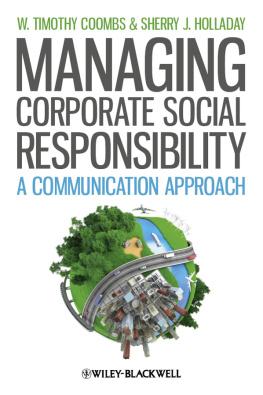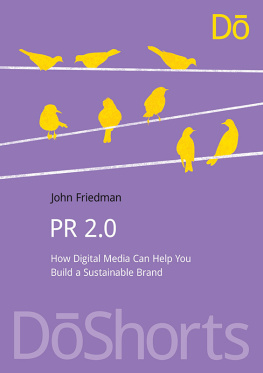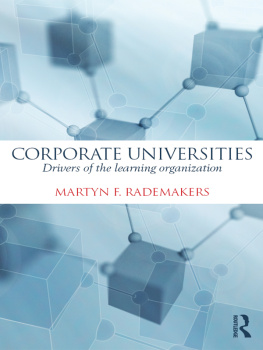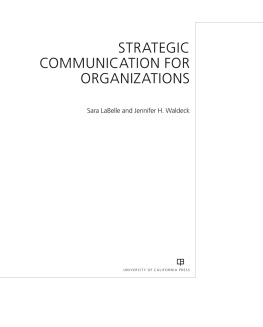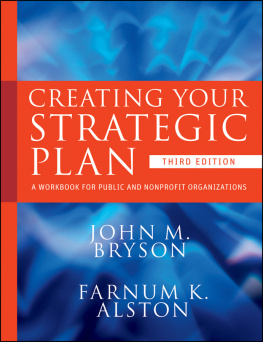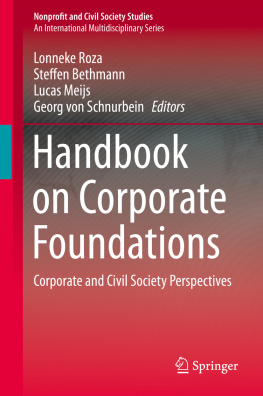This edition first published 2012
2012 W. Timothy Coombs and Sherry J. Holladay
Blackwell Publishing was acquired by John Wiley & Sons in February 2007. Blackwells publishing program has been merged with Wileys global Scientific, Technical, and Medical business to form Wiley-Blackwell.
Registered Office
John Wiley & Sons Ltd, The Atrium, Southern Gate, Chichester, West Sussex, PO19 8SQ, UK
Editorial Offices
350 Main Street, Malden, MA 02148-5020, USA
9600 Garsington Road, Oxford, OX4 2DQ, UK
The Atrium, Southern Gate, Chichester, West Sussex, PO19 8SQ, UK
For details of our global editorial offices, for customer services, and for information about how to apply for permission to reuse the copyright material in this book please see our website at www.wiley.com/wiley-blackwell.
The right of W. Timothy Coombs and Sherry J. Holladay to be identified as the authors of this work has been asserted in accordance with the UK Copyright, Designs and Patents Act 1988.
All rights reserved. No part of this publication may be reproduced, stored in a retrieval system, or transmitted, in any form or by any means, electronic, mechanical, photocopying, recording or otherwise, except as permitted by the UK Copyright, Designs and Patents Act 1988, without the prior permission of the publisher.
Wiley also publishes its books in a variety of electronic formats. Some content that appears in print may not be available in electronic books.
Designations used by companies to distinguish their products are often claimed as trademarks. All brand names and product names used in this book are trade names, service marks, trademarks or registered trademarks of their respective owners. The publisher is not associated with any product or vendor mentioned in this book. This publication is designed to provide accurate and authoritative information in regard to the subject matter covered. It is sold on the understanding that the publisher is not engaged in rendering professional services. If professional advice or other expert assistance is required, the services of a competent professional should be sought.
Library of Congress Cataloging-in-Publication Data
Coombs, W. Timothy.
Managing corporate social responsibility : a communication approach / W. Timothy Coombs, Sherry J. Holladay.
p. cm.
Includes bibliographical references and index.
ISBN 978-1-4443-3629-0 (hardback) ISBN 978-1-4443-3645-0 (paperback)
1. Social responsibility of business. 2. Business communication. I. Holladay, Sherry J. II. Title.
HD60.C6347 2011
658.4'08dc23
2011017060
A catalogue record for this book is available from the British Library.
This book is published in the following electronic formats: ePDFs 9781118106655; Wiley Online Library 9781118106686; ePub 9781118106662; Kindle 9781118106679
We dedicate this book to Jeanne, Tom, and Dorothy.
Acknowledgments
Many individuals supported us along the way to make this text a reality, and to all we are very grateful. Most importantly, we thank Elizabeth Swayze, our editor at Wiley-Blackwell, for continuing to be an enthusiastic and responsive advocate for our work. This text, along with our previous publications with Wiley-Blackwell, has benefited from Elizabeths encouragement and judicious feedback. Elizabeths guidance has enabled us to pursue projects that are important to our discipline, accessible to our readers, and often enable us to push the boundaries of the status quo.
We owe thanks to our production team who worked hard to get our manuscript into shape. Matthew Brown ably supervised the process and amazingly kept everyone on a tight schedule. We acknowledge Dave Nash, who worked with permissions and images to secure visual elements we believed would enhance the book. Dave persistently sought permissions from often reluctant (and sometimes completely uncooperative) sources. We also thank Cheryl Adam, our copy-editor. Cheryls competence undoubtedly makes us look better and adds to our readers experiences with the material in our book.
We also thank the scholars who reviewed the early version of the manuscript and offered suggestions that enhanced the book.
W. Timothy Coombs
Sherry J. Holladay
University of Central Florida, Orlando
Conceptualizing Corporate Social Responsibility

Home Depot, the worlds largest home improvement retailer, operates in the US, Canada, Mexico, and China. Home Depot supports Team Depot, a volunteer program led by store associates that participates in community programs.
Courtesy of Volunteer Canada
Apartheid is an historical artifact for many people reading this book rather than a current issue or reality. Apartheid was a severe, state-sanctioned racial segregation practiced in South Africa and what was then called Rhodesia (now Zimbabwe). A white minority used apartheid to oppress the indigenous black populations. In the 1970s, Dr. Leon Howard Sullivan, a US minister, plotted a corrective course of action that became known as the Sullivan Principles. The Sullivan Principles were designed to help end apartheid in South Africa by placing requirements on US corporations wanting to conduct business in South Africa. Box 1.1 lists the final seven points to the Sullivan Principles (Leon H. Sullivan Foundation, n.d.). The Sullivan Principles, along with the divestment campaign of the 1980s, did exert some pressure on the South African government. The divestment campaign worked in tandem with the Sullivan Principles. Investors were asked to divest (remove investments) from any US companies that did not adopt the Sullivan Principles. College campuses were a hotbed of activity for divestment pressures in the 1980s. Campus protests brought attention to the issue and pressured universities to cease investing in corporations doing business in South Africa. While the Sullivan Principles alone precipitated very little change, the divestment campaign is credited with having a significant effect on eradicating apartheid in South Africa.
Box 1.1 The Sullivan Principles
Non-segregation of the races in all eating, comfort, and work facilities.
Equal and fair employment practices for all employees.
Equal pay for all employees doing equal or comparable work for the same period of time.
Initiation of and development of training programs that will prepare, in substantial numbers, blacks and other nonwhites for supervisory, administrative, clerical, and technical jobs.
Increasing the number of blacks and other nonwhites in management and supervisory positions.
Improving the quality of life for blacks and other nonwhites outside the work environment in such areas as housing, transportation, school, recreation, and health facilities.
Working to eliminate laws and customs that impede social, economic, and political justice. (added in 1984)
Source : Leon H. Sullivan Foundation (n.d.).
The Sullivan Principles and related divestment efforts are indicators of corporate social responsibility (CSR) making a difference on a global scale. Fair treatment of workers and socially responsible investing are recognized today as CSR. The Sullivan Principles provide a foundation for socially responsible investing and, therefore, comprise a form of CSR as well. The focus of the Sullivan Principles was social improvement through the elimination of apartheid. The Sullivan Principles were not the first CSR effort or the first socially responsible investing guidelines to appear in the business world. However, the anti-apartheid efforts illustrated the potential power of CSR. Corporations were pressured to change their behavior not because their actions were illegal but because their actions failed to meet expectations for responsible behavior.

